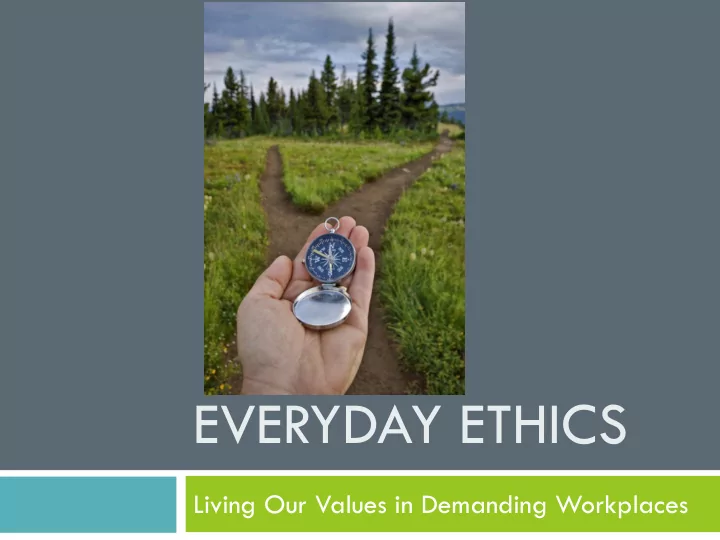

EVERYDAY ETHICS Living Our Values in Demanding Workplaces
Session Objectives Review major ethical concepts • Practice ethical decision making skills with • case examples Develop strategies to sustain actions which • are consistent with professional values
What do we mean by ETHICS? And, why should ethics matter to Social Workers?
Ethical Theories Competing visions of the kind of world we ought to live in Based on different “facts” in a situation being ethically relevant and important Provide different ways of explaining and justifying what we do or omit doing
Theoretical Approaches to Ethics Absolutism Relativism Rejects fixed moral rules as the Stresses the overriding importance of primary consideration. Focuses fixed moral rules/principles on context or consequences (Deontologists) (Teleologists) An option is chosen because it Holds that an action is inherently leads to desired results, such right or wrong, apart from any as achieving something which resulting consequences is inherently valued Focuses on the amount of good Ethical rules can be formulated and produced, or the balance of should hold under all circumstances good over evil, or minimizing harm.
Keys to Understanding… Facts Values Emotions
Types of Ethical Problems Factually Problematic W e don’t know (or can’t know) certain relevant information. Conceptually Problematic We are unsure what we ought to mean when acting on particular values or principles, for example “acting responsibly” Ethics Conflict Individuals involved assign different weight to a value/principle There are barriers to taking ethical actions Ethical Dilemma We have to choose between equally unwelcome alternatives No matter what is done, it will cause harm. (Robison & Reeser, 2000)
What is Ethical Decision-Making? Decision-making involves making a choice among several options. Ethical decision-making is a process of selecting among alternatives emerging from; values (personal & professional) ethical principles ethical responsibilities of a social worker (Maliskova, 2013)
How Does a Decision-Making Tool Help? Provides a systematic framework for considering what is important and weighing out options Can be used for deciding how to approach individual cases or systemic issues Challenges us to think through matters we may have taken for granted
Ethics Framework 1. Identify the key question 2. Identify the facts 3. Identify the guiding values 4. Prioritize the values 5. Brainstorm the options 6. Analyze options 7. Make a decision 8. Reflect and learn from your choices (Jiwani, 2013)
Identify the Key Question When determining the problem to be solved…. Separate practice considerations and ethical components If we get an answer to this question, will it provide sufficient direction for us to deal with the issue? Possible questions might be: How should I respond to (person or situation)? Or: What should the goals of intervention be for this client/family?
Get the Facts Straight a) What do we know for sure? b) What don't we know that we can find out? c) What information can't we know?
Identify What Matters Respect for the Inherent Dignity and Worth of Persons Pursuit of Social Justice Service to Humanity Integrity in Professional Practice Confidentiality in Professional Practice Competence in Professional Practice (CASW, 2005)
Prioritize - What Should Matter Most? Ethical Principles Screen (Loewenberg, Dolgoff, & Harrington, 2000)
Brainstorm Possible Choices
Analyze Options Which options best live up to what should matter most?
Make a Decision & Put it into Action Value has small worth, except as it is moved, or is moveable, from believing into doing, from verbal affirmation into action . Helen Harris Perlman
Reflect and Learn from your Choices The idea is that we should aspire to use critical thinking skills to do the best we can when making decisions, even if we may later come to believe that we should have made a different decision. (Jiwani, 2013)
CASE STUDY You have known Joy in a Social Work capacity for a number of years. Joy is a mother of two young sons. Over the years, she has faced some struggles. Her previous partner was abusive. One of her boys developed significant behavioural problems, and was having a lot of trouble managing at school. Joy struggled with depression, and was so desperate that she attempted suicide on one occasion. Joy is receiving income assistance benefits (PWD). She comes to you on this occasion because she needs you to complete some paperwork so that her benefits can continue. As you speak with Joy, you can see that she is happy and hopeful. She tells you how well her children are doing in their new school and describes the great house and neighbourhood they are living in. She shares that she is able to pick up some shifts at a local market, where she met her current partner, Pat. She notes how wonderful it is to have some help with the boys and the monthly bills. At the same time, the relationship is new and she wonders whether Pat will really want to take on all this responsibility.
Recommend
More recommend